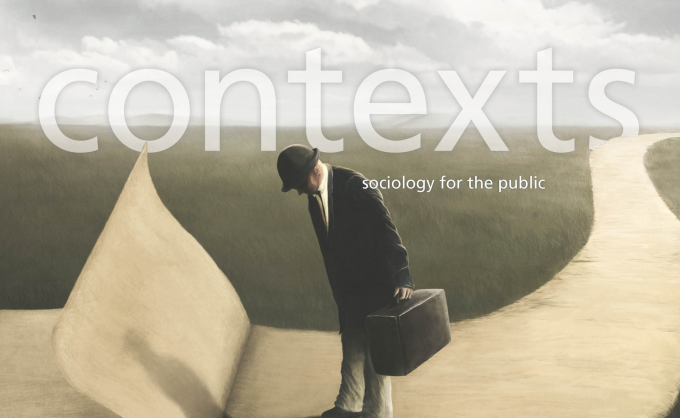
There is beauty in an ending, the serene light at dusk. This issue is the last of our editorship, the last print edition of Contexts, and in that sense, a crescendo of conversations spanning 25 years.
For us, print offers a kind of tactile intimacy. We encourage you to slide your fingers across the words as you enjoy the social worlds you encounter. Starting with the next issue, Contexts will move to a fully digital format. The transition will change how we gather, but not why we do it. The spirit of the magazine—curiosity and courage to champion a sociology for the public—will thrive in new ways.
Along for the ride are some stylish writers. Owen Whooley draws attention to a “warrior mentality” and “masculine police culture” to explain why officers think that mental health work is not “real” police work. Even if we send officers to mental health school, the curriculum is corrupted by stereotypes and jokes that “dilute the lessons of crisis intervention training.”
Religion also goes back to school. In public education, “one side speaks of God, morality, liberty, and the restoration of American values, the other of democracy, pluralism, church-state separation, and value erosion.” Where will this tug-of-war between “Christian nation” and “pluralist America” take us?
For Caroline Hanley, the answer might be to a conflict resolution center that uses restorative justice to heal divisions. Hanley zooms in on public sector work in New York to examine “democratic institutions under attack” (sad fact: fewer than a quarter of Americans trust their government).
When school and class let out, it’s time to get a job. Nicole Christine Muffit wonders, “If someone offered you a job where you could be your own boss, work from home, set your own hours, and make as much money as you want, wouldn’t you take it?” Sounds tempting, but in the multi-level marketing company she studied, the promise proves “ultimately false.”
After work, dim the lights and turn on Buffy the Vampire Slayer, Wonder Woman, The Matrix, or Fifty Shades of Gray. Whatever your pleasure, these have something unexpected in common: They expose viewers to bondage, discipline/domination, submission/sadism, and masochism (BDSM) practices that involve power exchange and control. Enjoyed by at least five million people in Canada and the United States, BDSM is not about “discovering something entirely new” but recognizing a part of yourself that has “always been there.”
If you know Contexts, then you can appreciate that our signature “4 Rs”—work that is rigorous, relevant, readable, and rad—animate every page of the magazine. Our writers will also take you to No Kings protests in Ohio, gay bars in Kansas City, and a “colorblind” Brazil. Essayists expose police interactions with trans and gender nonconforming people, global public opinion about abortion, pain in sexual encounters, elder food insecurity, and emerging facets of the future of academic publishing. You’ll read conversations with past editors Fabio Rojas and Rashawn Ray—and with us! Anchoring it all is a thought piece by Daniel F. Chambliss on seeking out top-tier peers.
As we turn the page from print to digital, our editorial team dedicates this issue to every contributor who trusted us with your words. To every reader who found something here that moved you. And most of all, to the indefatigable belief that ideas about and for the public matter.
Endings are never just endings; they are an invitation for what comes next. We are not closing a door so much as walking through it into the light of a new day.
–Amin Ghaziani, University of California-Santa Barbara, and Seth Abrutyn, University of British Columbia



